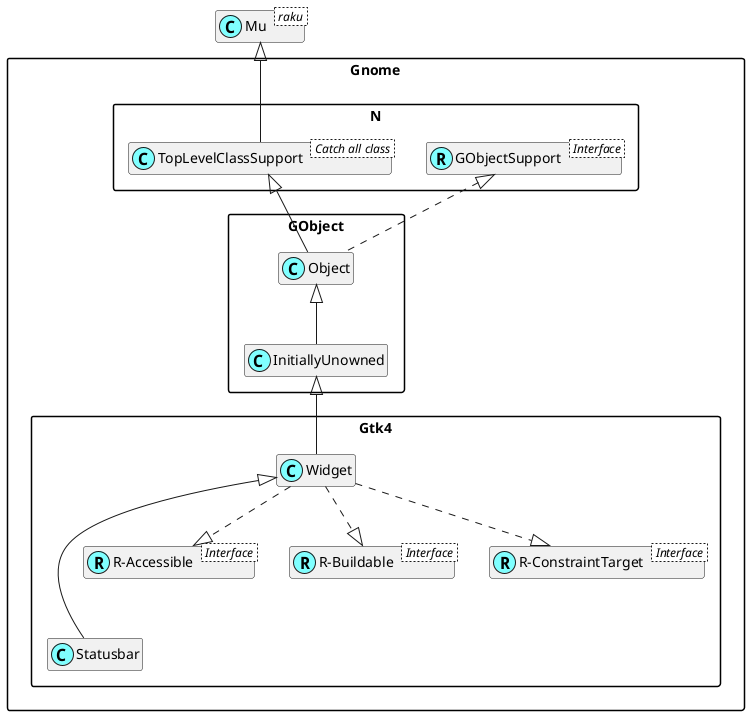
Gnome::Gtk4::Statusbar
Description
A Gnome::Gtk4::Statusbar widget is usually placed along the bottom of an application's main Gnome::Gtk4::Window.

A GtkStatusBar may provide a regular commentary of the application's status (as is usually the case in a web browser, for example), or may be used to simply output a message when the status changes, (when an upload is complete in an FTP client, for example).
Status bars in GTK maintain a stack of messages. The message at the top of the each bar’s stack is the one that will currently be displayed.
Any messages added to a statusbar’s stack must specify a context id that is used to uniquely identify the source of a message. This context id can be generated by .get-context-id(), given a message and the statusbar that it will be added to. Note that messages are stored in a stack, and when choosing which message to display, the stack structure is adhered to, regardless of the context identifier of a message.
One could say that a statusbar maintains one stack of messages for display purposes, but allows multiple message producers to maintain sub-stacks of the messages they produced (via context ids).
Status bars are created using .newstatusbar().
Messages are added to the bar’s stack with .push().
The message at the top of the stack can be removed using .pop(). A message can be removed from anywhere in the stack if its message id was recorded at the time it was added. This is done using .remove().
CSS node
Gnome::Gtk4::Statusbar has a single CSS node with name statusbar.
Uml Diagram

Class initialization
Note: The native version of this class is deprecated in gtk4-lib() since version 4.10
new
:native-object
Create an object using a native object from an object of the same type found elsewhere. See also Gnome::N::TopLevelSupportClass.
multi method new ( N-Object() :$native-object! )
new-statusbar
Note: The native version of this routine is deprecated in gtk4-lib() since version 4.10
Creates a new Gnome::Gtk4::Statusbar ready for messages.
method new-statusbar ( --> Gnome::Gtk4::Statusbar )
Methods
get-context-id
Note: The native version of this routine is deprecated in gtk4-lib() since version 4.10
Returns a new context identifier, given a description of the actual context.
Note that the description is not shown in the UI.
method get-context-id ( Str $context-description --> UInt )
$context-description; textual description of what context the new message is being used in.
Return value; an integer id.
pop
Note: The native version of this routine is deprecated in gtk4-lib() since version 4.10
Removes the first message in the Gnome::Gtk4::Statusbar’s stack with the given context id.
Note that this may not change the displayed message, if the message at the top of the stack has a different context id.
method pop ( UInt() $context-id )
$context-id; a context identifier.
push
Note: The native version of this routine is deprecated in gtk4-lib() since version 4.10
Pushes a new message onto a statusbar’s stack.
method push ( UInt() $context-id, Str $text --> UInt )
$context-id; the message’s context id, as returned by
.get-context-id().$text; the message to add to the statusbar.
Return value; a message id that can be used with .remove()..
remove
Note: The native version of this routine is deprecated in gtk4-lib() since version 4.10
Forces the removal of a message from a statusbar’s stack. The exact $context-id and $message-id must be specified.
method remove ( UInt() $context-id, UInt() $message-id )
$context-id; a context identifier.
$message-id; a message identifier, as returned by .push().
remove-all
Note: The native version of this routine is deprecated in gtk4-lib() since version 4.10
Forces the removal of all messages from a statusbar's stack with the exact $context-id.
method remove-all ( UInt() $context-id )
$context-id; a context identifier.
Signals
text-popped
Emitted whenever a new message is popped off a statusbar's stack.
method handler ( guint $context-id, Str $text, Int :$_handle_id, N-GObject :$_native-object, Gnome::Gtk4::Statusbar :$_widget, *%user-options )
$context-id; the context id of the relevant message/statusbar.
$text; the message that was just popped.
$_handle_id; The registered event handler id.
$_native-object; The native object provided by the Raku object which registered this event. This is a native Gnome::Gtk4::Statusbar object.
%user-options; A list of named arguments provided by .register-signal() in class Object.
text-pushed
Emitted whenever a new message gets pushed onto a statusbar's stack.
method handler ( guint $context-id, Str $text, Int :$_handle_id, N-GObject :$_native-object, Gnome::Gtk4::Statusbar :$_widget, *%user-options )
$context-id; the context id of the relevant message/statusbar.
$text; the message that was pushed.
$_handle_id; The registered event handler id.
$_native-object; The native object provided by the Raku object which registered this event. This is a native Gnome::Gtk4::Statusbar object.
%user-options; A list of named arguments provided by .register-signal() in class Object.
 About my projects, references, blog posts, examples and tutorials
About my projects, references, blog posts, examples and tutorials